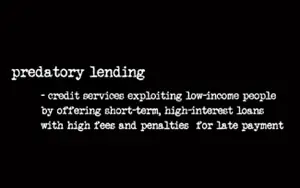It didn’t take long for Candi Wiley to get trapped. Short on cash, she went to a payday lender to get money to pay the light bill. “I needed $200 and they said, ‘I tell you what, we’ll give you five,’” she said. “They made it easy.”
Things got tough, though, when she tried to pay back the high-interest loan, so she took out another one to pay off the first. Pretty soon, she was nine loans out and in way over her head. “It’s just a vicious cycle and you do get to the point where they become the master and you become the slave,” she said. “I had to go to debtor’s court.”
In an effort to build momentum for legislative change, The Alliance for Responsible Lending in Alabama (ARLA) will host a Fair Lending Rally at the YWCA Central Alabama on March 2, 2015 from 11:30 a.m. to 1 p.m. The free event is open to the public, and lunch will be served.
The heart of the discussion will focus on legislation that allows lending institutions in Alabama to charge 456% APR on payday loans and 300% APR on automobile title loans. Targeted at those who can least afford them, the loans can ruin families financially.
“They really take people from a financial tight spot to financial devastation and that’s the trend we see time and again with the people we serve,” said Joan Witherspoon-Norris, director of social justice programming for the YWCA. “The YW came to this issue through the people we serve. We work really hard to get those who are struggling back into permanent housing and financial stability, and this makes it much more difficult.”
ARLA is a network of congregations, nonprofits and community groups working together to end predatory lending practices in Alabama. One of the group’s goals is to get the legislature to establish a 36 percent cap on payday loans and title loans.
“The people who want reform far outnumber those who want the status quo – the special interest groups who supported the legislation initially and profit from it,” Witherspoon-Norris said. “This is a chance for the groups that are working to end predatory lending to come together and remind each other that we’re not working in isolation. It’s also a show of force to legislators and a chance to convey to them that a lot of people care about this issue.”
If you or your organization would like to donate to or get involved with the YWCA, please click here.

